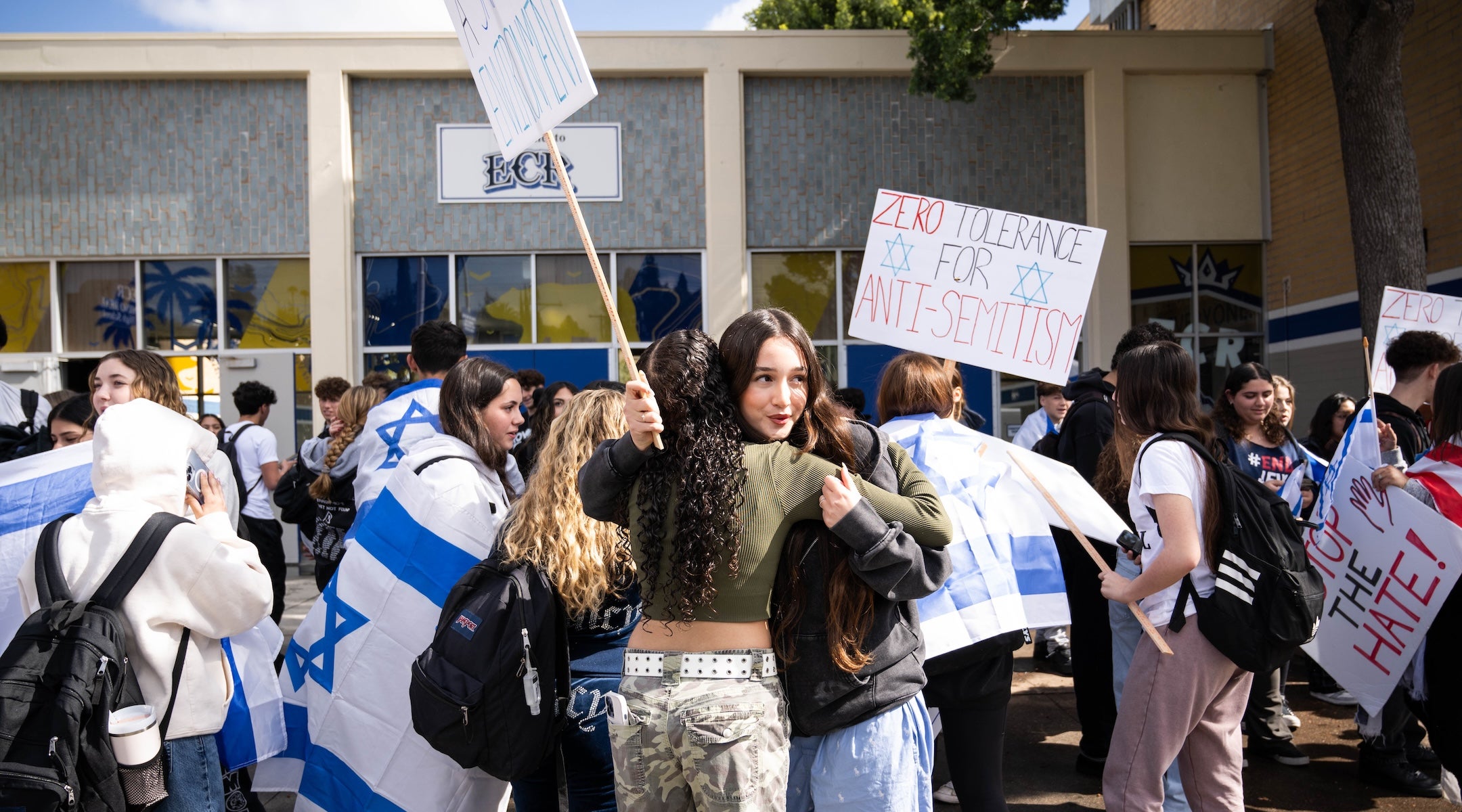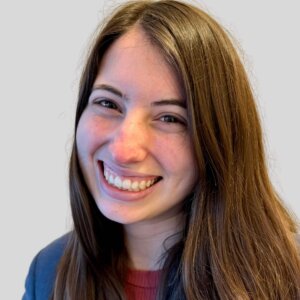How new laws are shaping what schools teach about the Israeli-Palestinian conflict
A new ‘antisemitism prevention’ law in California requires curricula to be ‘factually accurate’ and free of bias

Jewish students at El Camino Real Charter High School walk out to protest antisemitic incidents at the Los Angeles school on Feb. 27, 2024. Photo by Sarah Reingewirtz/MediaNews Group/Los Angeles Daily News via Getty Images
Teachers, parents and schools have long debated what students should learn about the Israeli-Palestinian conflict. But lesson plans have typically been discussed in PTA gatherings, faculty meetings and curriculum committees — not determined by legislation.
That’s changing, as new laws around the country seek to regulate how narratives about the conflict are taught. The measures are testing the boundaries of classroom free speech, teeing up legal battles between teachers who want to express pro-Palestinian viewpoints in the classroom and those who see such lessons as unprofessional or antisemitic.
The latest flashpoint is in California, where a new “antisemitism prevention” bill was signed into law this month over the objections of the state’s largest teachers union, partly in response to controversy created by the state’s ethnic studies curriculum, which Gov. Gavin Newsom made a graduation requirement in 2021.
A tale of two curriculums
“Is Israel a settler colonial state?” and “If so, what does that mean for us in regard to who to support?”
Those were questions a San Jose, California, teacher posed to students in January 2025, along with a YouTube video titled “Zionism is not the same as Judaism,” featuring a spokesperson from the anti-Zionist group Neturei Karta.
In April, the California Department of Education found that the lesson “discriminated against Jewish students” and required the school district to provide teacher training on presenting controversial topics in a balanced, non-discriminatory way.
Such disputes have become prevalent in California in the four years since the adoption of the state’s ethnic studies curriculum.
Many Jewish groups support a curriculum that includes lessons on antisemitism and Jewish identity, alongside units on Black, Latino, Native American, and Asian American and Pacific Islander communities.
But an alternative curriculum, created by the “Liberated Ethnic Studies Model Curriculum Consortium,” has drawn sharp criticism for portraying Israel as a colonial state and omitting discussion of antisemitism while covering other forms of bigotry. For instance, it defines the Boycott, Divestment and Sanctions movement as a “global social movement that currently aims to establish freedom for Palestinians living under apartheid conditions.”
“If I look at the materials that they’re putting forward, it doesn’t provide any balance,” said Larry Shoham, a Jewish English and business teacher at Hamilton High School in Los Angeles. “And I’m just afraid that when students are exposed to this curriculum, we’re planting seeds of prejudice and hatred in the next generation.”
Several Jewish groups have sought to keep the “liberated” curriculum out of public schools. But achieving that goal through legal avenues has yielded mixed results.
A coalition of Jewish groups had success in Santa Ana, California, where in February the school district settled a lawsuit that alleged ethnic studies courses were biased against Jews. As part of the discovery process, the plaintiffs uncovered several antisemitic messages from the school board, including a text message from a committee member suggesting that “we may need to use Passover to get all new courses approved,” since Jews would not be present. As part of the settlement, the district agreed to terminate their “liberated” ethnic studies classes and redesign the courses with public input.
But in Los Angeles, a federal judge issued a rebuke of parents who sought to use the law to change curriculum. A group under the name “Concerned Jewish Parents and Teachers of Los Angeles” sued the Liberated Ethnic Studies Model Curriculum Consortium, arguing that they had a religious belief in Zionism, and the “liberated” ethnic studies curriculum made it unsafe to express Zionist beliefs.
The parents, the judge wrote in his decision, had the right to petition for curricular changes. But the curriculum, even if offensive to some, was not discriminatory or illegal.
“It is far from clear that learning about Israel and Palestine or encountering teaching materials with which one disagrees constitutes an injury,” Judge Fernando Olguin wrote.
Bills aimed at restricting the “liberated” ethnic studies curriculum have also stalled. Last spring, the Jewish Public Affairs Committee of California championed a bill that would have required school districts to submit ethnic studies curricula to the California Department of Education for review, ensuring “content is historically accurate, free from antisemitic bias, and aligned with educational best practices,” JPAC wrote on its website.
But facing opposition from the California Teachers Association and some civil liberties groups, the bill never made it into committee. JPAC shifted its focus to a broader measure creating a new statewide office to combat antisemitism in public schools, JPAC executive director David Bocarsly said in an interview.
That bill, with the requirement that curricula be “factually accurate” and “consistent with accepted standards of professional responsibility, rather than advocacy, personal opinion, bias, or partisanship,” just passed.
The new law’s impact
The law establishes a state Office of Civil Rights and an antisemitism prevention coordinator, who will track complaints, issue guidance, and coordinate training about antisemitism.
As for curriculum, supporters say the law simply reinforces longstanding norms for teachers: that lessons should be grounded in fact and free of political bias — requirements which don’t bar thoughtful discussions about Israelis and Palestinians.
“There’s nothing in this bill or existing law that prevents teachers from bringing up international conflicts or controversial issues, and to be able to provide opportunities for students to engage with it with critical thought,” Bocarsly said.
Critics, however, see the law’s vague language as a deliberate attempt to stifle speech and make educators think twice before broaching the subject at all.
“Are you allowed to talk about the occupation of the West Bank?” said Jenin Younes, national legal director at the American-Arab Anti-Discrimination Committee. “Are you allowed to talk about the Nakba from the Palestinians perspective in 1948? That’s not clear.”
Younes said she’s also troubled by a provision that allows anyone — not just students or parents — to file a complaint about antisemitism. That, she said, “opens up the door to people from outside who want to harass teachers.”
Some educators share those concerns. Mara Harvey, a Jewish social studies teacher at Discovery High School in Sacramento, wrote an op-ed calling an earlier version of California’s law “the wrong response to a real problem” and part of a broader push to bring “right-wing, Trump-style censorship to California schools.”
“Consider what it could mean in a real classroom: A student brings in an article from Haaretz (one of Israel’s most respected newspapers) criticizing government policies. Could a discussion on this be deemed antisemitic?” Harvey wrote. “Yes, it could.”
Combatting antisemitism or ‘attacking teachers’?
Similar debates about curriculum have played out in schools across the country. In Plano, Texas, a high school classroom used a Jeopardy-style game with the prompt, “Group who wants to gain back the country they lost to Israel.” The correct answer: “Who are the Palestinians?”
In August, Texas Attorney General Ken Paxton launched an investigation into Plano Independent School District, writing in a letter that “accounts have circulated that teachers are presenting biased materials and insisting that students take a pro-Palestinian view.”
“Any teacher or administrator that has facilitated or supported radical anti-Israel rhetoric in our schools should be fired immediately,” Paxton wrote on X.
In a statement, the school district said the claims of antisemitism were false and amounted to “political theater.”
Other states are also grappling with how best to address alleged bias in schools.
In Kansas, a law passed in May prohibits “incorporating or allowing funding of antisemitic curriculum.”
Arizona considered an even tougher approach. Democratic Gov. Katie Hobbs vetoed a bill that would have let parents sue educators for teaching antisemitism — meaning teachers would have been personally liable for lawyer fees and financial damages.
“Unfortunately, this bill is not about antisemitism; it’s about attacking our teachers,” Hobbs wrote in a letter explaining her veto.
In other cases, the curriculum has simply been removed. In Massachusetts, the state teachers association’s “curriculum resources” for lessons on “Israel and Occupied Palestine” included an image of a Star of David made of dollar bills. The curriculum resources were taken down after intense backlash.
Incidents like that are what Rebecca Schgallis, K-12 director at CAMERA Education — which describes itself as “fighting antisemitism and anti-Israel bias in education” — cites in arguing for closer review of classroom materials nationwide.
She pointed to resources such as “Teaching While Muslim,” a group of New Jersey Muslim educators who say they are “working to actively include social justice, anti-racist and anti-Islamophobic curricula and educators in our schools.” Content on the group’s website includes a worksheet instructing students to color the Palestinian flag over the entire map of Israel — though it’s unclear whether such a lesson has ever actually been taught in public school classrooms.
Because curriculum decisions are made locally, Schgallis said, it’s difficult to track how widespread such lessons are. Often, she added, the problem comes not from official materials but from individual teachers going “rogue.”
“I think teachers have an obligation to teach curriculum and not to insert their personal viewpoints,” Schgallis said. “Everyone has the right to free speech outside of the classroom, but when teachers are teaching, they have a job to do.”















